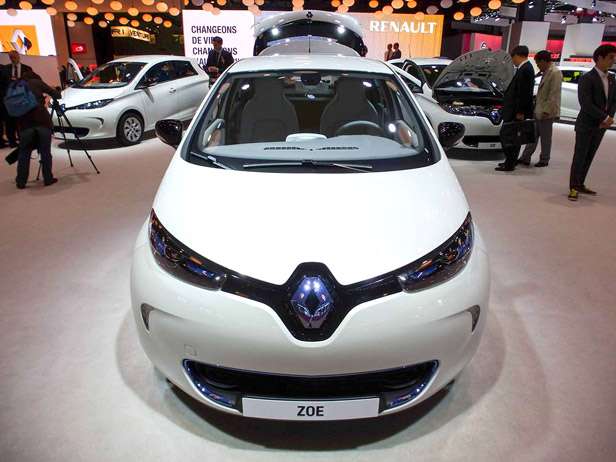Renault and Others Debut Electric Cars at Paris Show

At the Paris Auto show, auto giant Renault extended its already strong commitment to electric vehicles yesterday by launching sales of a small electric car with a price and range that could offer mass appeal. Major German automakers Volkswagen, BMW, and Daimler joined Renault’s commitment to electric cars at the show by launching or announcing some of their first battery-only EVs. The show opens to the public today and runs for two weeks.
The Renault Zoe costs less than most electric vehicles at 20,700 euros ($26,650), or 13,700 Euros in France, thanks to government incentives. And it travels 210 kilometers (130 miles), according to the standard European mileage test. Simon Luque, Zoe project director for Renault, promises that this will translate into 150 kilometers of real-world driving. “That is the best in the market today,” boasts Luque.
Toyota, in contrast, recently reiterated its long-held skepticism on the viability of EVs, given the cost and limits of battery technology (see “Will Electric Vehicles Finally Succeed?”). The Japanese automaker, the world leader in hybrid vehicles, launched the eQ, a much-anticipated battery version of its iQ minicar yesterday, but said it would produce just 100 of these 85-kilometer range vehicles.
Luque says Renault decided that the capacity of the Zoe’s battery would be 22 kilowatt-hours based on how much space it could make for it in a small car. He adds that three advances in efficiency enabled his team to extend real-world range by 20 to 30 kilometers.
First, Zoe carries the first automotive heat-pump heat and air-conditioning system, capturing heat outside and pumping it into the car rather than simply heating a resistor, as other electric vehicles do. This means that the Zoe can deliver three kilowatts of heat while drawing just one kilowatt from the battery.
The two other range-extending innovations are a low-friction tire from Michelin that is making its commercial debut with the Zoe, and a braking control system that senses how hard drivers hit the pedal and keeps the conventional friction-pad brakes idle unless it detects a need for strong braking. As a result it maximizes the use of the regenerative braking, whereby the car’s electric motor operates as a generator to pull energy from the car’s momentum and thus recharge its battery.
The Zoe’s impressive range comes at a key moment for Renault and its corporate partner, Nissan. The Renault-Nissan Alliance has staked its future on the electric car since pushing heavily into battery-powered vehicles five years ago. But sales have cooled this year for Nissan’s flagship EV, the Leaf, and it faces growing complaints from customers over the vehicle’s range (see “Air Air-Cooled Batteries Hurting Nissan Leaf Range?”).
Nissan originally claimed the vehicle would deliver 100 miles of travel on a full charge, but the EPA rated it for 73. Meanwhile some customers are complaining that they’re getting even less mileage, which Nissan attributes to higher-than-average use of the battery in unusually hot areas such as Phoenix.
This kind of customer dissatisfaction is part of Toyota’s argument for focusing on hybrid vehicles, which have gasoline engines that extend their range to 500 miles or more. “The market is not ready and the technology is not ready for pure electric vehicles as a mass vehicle,” says Gerald Killmann, Toyota’s director for powertrain R&D in Europe. He says that the eQ would cost about 36,000 euros if sold outright (Toyota plans to lease the 100 it is making). But that is about 50 percent more than Renault is asking for the larger Zoe, and the eQ’s 12-kilowatt-hour battery packs 45 percent less energy.
Killmann’s pricing figures would suggest that Renault is taking a loss on the Zoe. But Luque, for his part, insists this is not the case: “Our bosses never allow us to make a business case where we’re losing money.”
German automakers are also countering Toyota’s pessimism on the viability of electric vehicles. Daimler, in particular, unveiled three new ones at the Paris show. One of those is an electric version of Smart’s two-seat ForTwo, which the Daimler subsidiary started producing in June. Pitt Moos, product manager for the Smart Electric Drive, says it delivers a 145-kilometer range.
Moos adds that if any producer can manage to squeeze a profit out of small EVs, it will be Renault. That explains why his firm is teaming with Renault to develop a four-seat version of the Smart to be sold in 2014 or 2015. “Renault makes cheap cars and knows how to make money from them—something that Daimler has never learned,” he says.
Keep Reading
Most Popular
Large language models can do jaw-dropping things. But nobody knows exactly why.
And that's a problem. Figuring it out is one of the biggest scientific puzzles of our time and a crucial step towards controlling more powerful future models.
The problem with plug-in hybrids? Their drivers.
Plug-in hybrids are often sold as a transition to EVs, but new data from Europe shows we’re still underestimating the emissions they produce.
Google DeepMind’s new generative model makes Super Mario–like games from scratch
Genie learns how to control games by watching hours and hours of video. It could help train next-gen robots too.
How scientists traced a mysterious covid case back to six toilets
When wastewater surveillance turns into a hunt for a single infected individual, the ethics get tricky.
Stay connected
Get the latest updates from
MIT Technology Review
Discover special offers, top stories, upcoming events, and more.